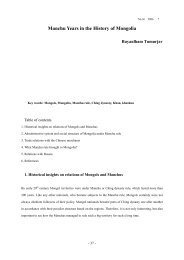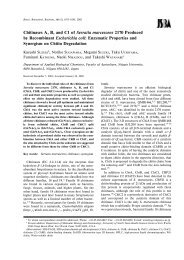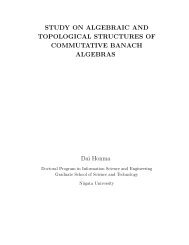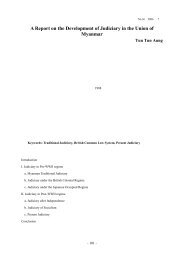An Overview of the Albanian History:
An Overview of the Albanian History:
An Overview of the Albanian History:
Create successful ePaper yourself
Turn your PDF publications into a flip-book with our unique Google optimized e-Paper software.
No.34 2005 12 <br />
III. The end <strong>of</strong> Ottoman Rule and <strong>Albanian</strong> Independence<br />
The <strong>Albanian</strong>s once more rose against <strong>the</strong> Ottoman Empire in May 1912 and took <strong>the</strong> Macedonian capital,<br />
Skopje, by August. Stunned, <strong>the</strong> Young Turks regime acceded to some <strong>of</strong> <strong>the</strong> rebel’s demands. The First<br />
Balkan War, however, erupted before a final settlement could be worked out. Most <strong>Albanian</strong>s remained<br />
neutral during <strong>the</strong> war, during which <strong>the</strong> Balkan allies, <strong>the</strong> Serbs, Bulgarians, and Greeks, quickly drove <strong>the</strong><br />
Turks to <strong>the</strong> walls <strong>of</strong> Constantinople. The Montenegrins surrounded Shkodra with <strong>the</strong> help <strong>of</strong> nor<strong>the</strong>rn<br />
<strong>Albanian</strong> tribes anxious to fight <strong>the</strong> Ottoman Turks. Serb forces took much <strong>of</strong> nor<strong>the</strong>rn Albania, and <strong>the</strong><br />
Greeks captured Janina and parts <strong>of</strong> sou<strong>the</strong>rn Albania.<br />
<strong>An</strong> assembly <strong>of</strong> eighty-three Muslim and Christian leaders meeting in Vlora in November 1912 declared<br />
Albania an independent country and set up a provisional government, but an ambassadorial conference that<br />
opened in London in December decided <strong>the</strong> major questions concerning <strong>the</strong> <strong>Albanian</strong>s after <strong>the</strong> First Balkan<br />
War in its concluding Treaty <strong>of</strong> London <strong>of</strong> May 1913. One <strong>of</strong> Serbia’s primary war aims was to gain an<br />
Adriatic port, preferably Durrës 18 . Austria-Hungary and Italy opposed giving Serbia an outlet to <strong>the</strong> Adriatic,<br />
which <strong>the</strong>y feared would become a Russian port. They instead supported <strong>the</strong> creation <strong>of</strong> an autonomous<br />
Albania. Russia backed Serbia and Montenegro's claims to <strong>Albanian</strong>-inhabited lands. Britain and Germany<br />
remained neutral 19 . Chaired by Britain's foreign secretary, Sir Edward Grey, <strong>the</strong> ambassadors' conference<br />
initially decided to create an autonomous Albania under continued Ottoman rule, but with <strong>the</strong> protection <strong>of</strong><br />
<strong>the</strong> Great Powers 20 . This solution, as detailed in <strong>the</strong> Treaty <strong>of</strong> London, was abandoned in <strong>the</strong> summer <strong>of</strong> 1913<br />
when it became obvious that <strong>the</strong> Ottoman Empire would, in <strong>the</strong> Second Balkan War, lose Macedonia and<br />
hence its overland connection with <strong>the</strong> <strong>Albanian</strong>-inhabited lands.<br />
In July 1913, <strong>the</strong> Great Powers opted to recognize an independent, neutral <strong>Albanian</strong> state ruled by a<br />
constitutional monarchy and under <strong>the</strong> protection <strong>of</strong> <strong>the</strong> Great Powers. The August 1913 Treaty <strong>of</strong> Bucharest<br />
established that independent Albania was a country with borders that gave <strong>the</strong> new state about 28,000 square<br />
kilometers <strong>of</strong> territory and a population <strong>of</strong> 800,000. Montenegro, whose tribesmen had resorted to terror, mass<br />
murder, and forced conversion in territories it coveted, had to surrender Shkodra. Serbia reluctantly<br />
succumbed to an ultimatum from Austria-Hungary, Germany, and Italy to withdraw from nor<strong>the</strong>rn Albania.<br />
The treaty, however, left large areas with majority <strong>Albanian</strong> populations, notably Kosovo and western<br />
Macedonia, outside <strong>the</strong> new state and failed to solve <strong>the</strong> region's nationality problems.<br />
After independence local power struggles, foreign provocations, miserable economic conditions, and<br />
- 245 -







